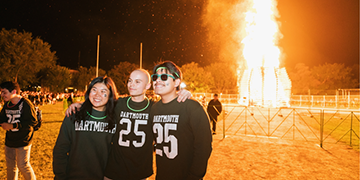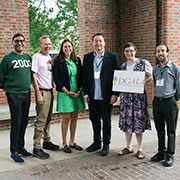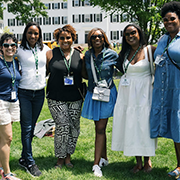Dartmouth NEXT Tackles U.S. STEM Talent Gap
Major grant funds innovative mentor programs to boost degrees in STEM fields.
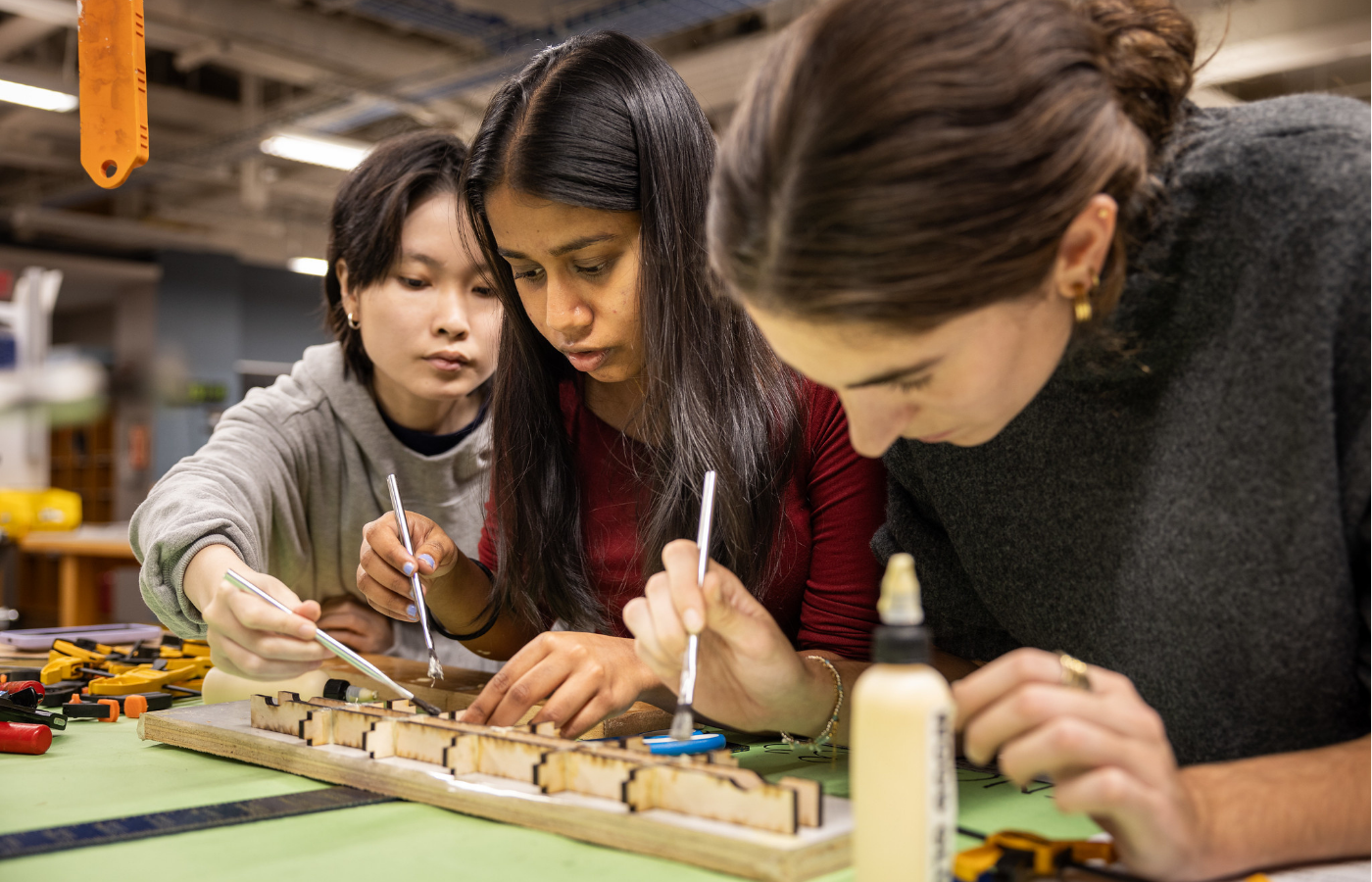
Jun 10, 2025
5 minute read
James Bressor
5 minute read
Dartmouth NEXT, the campuswide initiative to increase the number of students graduating with a STEM degree, continues to gain momentum; today, with significant philanthropic investment, it is placing greater emphasis on the power of mentoring to promote student success and achievement.
National industry and education organizations in recent years have cited a pressing need for U.S. universities to expand the number of students graduating with STEM degrees to increase American competitiveness and strengthen the nation’s global position in critical industries. The U.S. semiconductor industry, for example, faces a projected shortage of 67,000 computer scientists, engineers, and technicians by 2030.
Launched in 2022 with the joint support of then-incoming President Sian Leah Beilock and then-President Philip J. Hanlon ’77, Dartmouth NEXT is a comprehensive approach toward ensuring the success of students from all backgrounds who have expressed an interest in earning a STEM degree. The initiative encompasses multiple strategies to expand and enrich Dartmouth’s STEM offerings through four broad areas of focus: academic enrichment, scholars programs, research, and mentoring. Philanthropy is funding Dartmouth NEXT, and Dartmouth has made significant strides in resourcing the “moonshot” investment goal of $100 million announced in 2022.
Research has demonstrated that near-peer mentors—seniors, juniors, sophomores, and recent graduates—can play a crucial role in keeping younger students on track to graduate with a STEM degree. These mentors present material in novel ways, help students grasp complex concepts, and serve as role models, while also providing feedback to faculty. Their support is particularly important for first-year undergraduates adjusting to the demands of collegiate STEM coursework.
The Sherman Fairchild Foundation, which has a long relationship with Dartmouth, recently awarded a $12.5 million grant to advance near-peer mentoring programs. With this grant, private giving toward Dartmouth NEXT totals nearly $95 million.
The foundation’s grant will permanently endow 155 mentoring positions across three Dartmouth NEXT programs. This expansion will cover 20-30 percent of all STEM courses and nearly 100 percent of the early-stage, or “gateway,” courses. Success in these courses, which often have the largest enrollments, has been found to be particularly important for STEM retention.
In total, the grant will support 173 mentors in 107 courses, with combined enrollments of more than 4,000 students each year.
“Many of the world’s most difficult challenges urgently need more young people entering STEM fields,” says President Beilock, a cognitive scientist. “We know there are students across our nation who want to meet those challenges but aren’t able to complete a STEM degree without greater support. The National Science Foundation has called this shortfall ‘the missing millions’—students who can take on leadership roles in science-driven professions if they receive mentoring and advising early in their undergraduate years. Dartmouth NEXT is our comprehensive response to make this happen. With the generosity of alumni and friends, we’re creating a comprehensive suite of programs that benefits thousands of students every year.”
Dartmouth NEXT connects a total of 10 programs across campus, enabling Dartmouth to help prospective and incoming students understand the many STEM support options available to them. Some components of Dartmouth NEXT were established recently; others, such as the Teaching Science Fellows Program, which brings recent graduates into the classroom to assist students and faculty, have been operating for many years. The Sherman Fairchild Foundation grant will advance near-peer mentoring opportunities in three programs:
- Learning Fellows Program—Upper-year undergraduates support faculty and students through in-class activities across nearly all undergraduate disciplines;
- Dartmouth Emerging Engineers—Seniors, juniors, and sophomores advise first-year students taking engineering courses; and
- Teaching Science Fellows Program—Postbaccalaureate fellows partner with faculty to make biology and chemistry classes more accessible and provide academic support to undergraduates.
Lee Witters, the Eugene W. Leonard 1921 Professor of Medicine and professor of biological sciences, founded the Teaching Science Fellows Program 10 years ago with two goals in mind: to teach students—particularly those who may not have been fully prepared for the rigors of Dartmouth’s academic program—both how to learn and how to transform themselves into lifelong learners.
“If you help young people learn how to learn, that’s going to benefit them across all courses and all disciplines. So, while this program targets students in STEM courses, it is in no way specific to STEM,” says Witters, who is completing his 41st year of teaching at Dartmouth.
“The faculty have fully embraced the program, both in the biology and chemistry departments,” he says. “There’s constant feedback between our fellows and the faculty as to what’s going on in the class. The fellows benefit tremendously, as the experience of working closely with faculty helps prepare them to pursue an advanced degree.”
Most of the $95 million invested in Dartmouth NEXT has been directed to the endowment and the long-term sustainability of the programs. Key supporters of the initiative are alumni and parents who have played pioneering leadership roles in American technology and innovation: Penny S. Coulter and James G. Coulter ’82 P’15; Sonja Davidow and William H. Davidow ’57 TH’58; Eileen Chamberlain Donahoe ’81 and John J. Donahoe ’82 P’09,’15,’17; Brent R. Frei ’88 TH’89; Robin L. Gerstner and Louis V. Gerstner Jr. ’63 H’13; Sally Neukom and William H. Neukom ’64 H’15 P’90,’91,’97; Stacey E. Nicholas P’15 THP’16,’18 GRP’18; and Maureen L. Conway and Marc C. Thompson ’87 P’17.
The significance of near-peer mentoring
While there is an unmet national demand for more college graduates with STEM degrees, it’s not due to a lack of student interest. The challenge for colleges and universities is how to keep students who have expressed an interest in STEM majors in those academic programs. Some students arrive at college not fully prepared for the demands of collegiate-level STEM courses, and many students suffer from self-doubt. Nationally, more than half of first-year students who declared STEM majors at the start of college leave these fields before graduation.
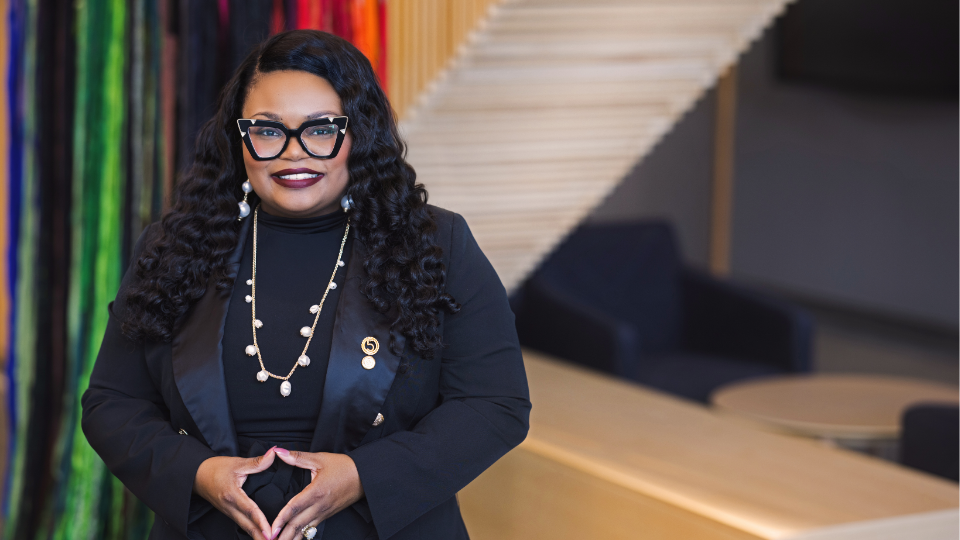
At Dartmouth, nearly 53 percent of students in the classes of 2018 through 2022 entered with a primary interest in a STEM major, but fewer than 36 percent of them graduated with a STEM degree.
Personal and group mentorship provided by fellow students and recent graduates can make a significant difference for students pursuing a STEM major. According to data collected at Dartmouth as well as research conducted by organizations such as the International Journal for STEM Education, mentors provide invaluable help for students who may need individualized attention. Their work contributes to increased retention rates for STEM programs. Of the DEE participants who graduated in 2024, for example, 95 percent majored in a STEM field, and more than 80 percent of participants in the E.E. Just Program successfully completed a major or minor in a STEM discipline—achievements made possible in part by near-peer mentoring.
For students suffering from imposter syndrome, intimidated by the idea of approaching a professor or needing more individualized support, mentors can prove invaluable.
“Near-peer mentorship creates a uniquely powerful dynamic: mentees gain confidence and clarity from someone who has recently navigated the same path, while mentors deepen their own understanding and develop a lasting sense of purpose,” says Professor of Engineering Petra Bonfert-Taylor, a cofounder of Dartmouth Emerging Engineers. “Programs like DEE build community, foster belonging, and empower both mentors and mentees to thrive—not just academically, but as emerging leaders.”
Cathy Welder, a senior lecturer in the Department of Chemistry, says the Learning Fellows Program has had a tremendous impact on her teaching, and students’ exam scores have increased significantly since fellows joined her in the classroom.
“Because I have help in the classroom, I now ask students to watch recorded lectures prior to class, and they solve problems in teams of five or six during the class periods,” she says. “Students have learning fellow and team support as they try to apply what they have learned to problems I provide.”
Feedback is consistently positive from undergraduates who were mentored by older students or post-baccalaureates through Dartmouth NEXT programs. Moses Matanda ’25, who later became a DEE tutor, remembers how well a learning fellow helped guide his academic experience. “She always directed us along the right path without telling us the answer, which I feel is the best way to ensure we learn without feeling stranded.”
Students who serve as mentors in Dartmouth NEXT programs must first participate in an orientation session that strengthens their ability to support both students and faculty, inside and outside the classroom, says Ansley Booker, the Penny and James Coulter 1982 Executive Director of Dartmouth NEXT. “We not only make them better mentors. We want to plant the seed that they could become faculty members one day—a kind of ‘grow your own STEM faculty’ model,” she says.
Namitha Alluri ’25 says her experience as a mentor with the Learning Fellows Program made her realize how much she loves teaching.
“Working alongside students, faculty, and staff helped me appreciate how collaborative learning really works, especially through the lens of my neuroscience background,” she says. “The program gave me a deep sense of purpose, and it’s been amazing to be part of a selfless, invigorating community built on connection—between students and learning fellows, between peers, and across the entire learning environment.”
Beilock says the Dartmouth NEXT’s impact will be lasting and far-reaching.
“The addition of peer mentoring to our excellent STEM ecosystem will position Dartmouth as a destination for any young person who wants to play a role in shaping the next century of science and technology,” she says. “If students bring their drive and their good ideas, we will provide all the support they need to flourish and to lead.”
Building on decades of success
Dartmouth NEXT coordinates and advances multiple programs supporting student achievement and leadership in STEM, faculty recruitment, and scholarship at the intersection of computational science and the rule of law. They are:
Research and mentoring:
E.E. Just Program
WISP Learning & Engagement
Scholar cohort programs:
Coulter Scholars Program
Gerstner Scholars Program
Neukom Postdoctoral Fellows
E.E. Just Early Career Faculty Fellows
Curricular support and mentoring:
Dartmouth Emerging Engineers
Dartmouth Learning Fellows Program
Teaching Science Fellows
Academic enrichment:
Susan and James Wright Center for the Study of Computation and Just Communities


